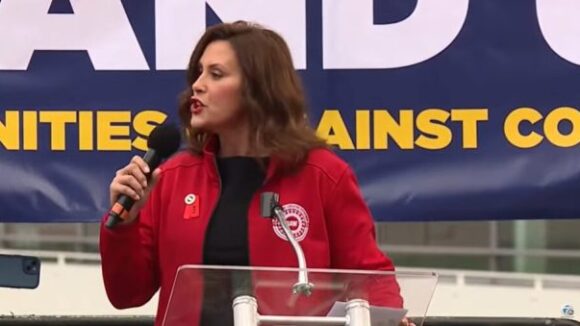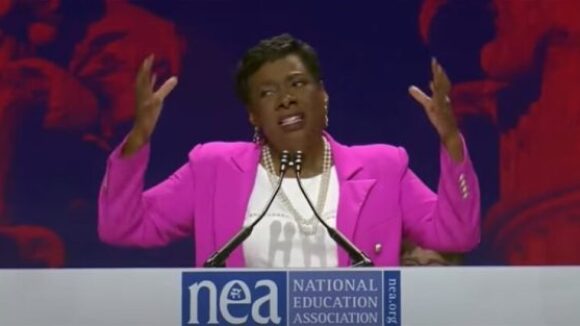Tyranny Triumphs in the Great Lakes State
Ignoring ample evidence of forced unionism’s unfairness and its damaging impact on jobs and incomes, Big Labor Michigan Gov. Gretchen Whitmer signed Right to Work destruction in 2023.

Back in the early to mid-1980’s, as they pressed first for passage of a state law barring forced union dues, and then to prevent Big Labor from overturning this law in a state referendum, Idaho Right to Work activists had few friends in the political establishment.
But neither the fierce animosity of Democrat politicians like then-Idaho Gov. John Evans nor the cool derision of Republican James McClure, the state’s senior U.S. senator at the time, made much of an impression on Gary Glenn, the leader of the Idaho Freedom to Work Committee.
Mr. Glenn was still in his early 20’s at the time.
But unlike Mr. Evans and Mr. McClure, he already understood, well before Idaho’s Right to Work law was adopted in early 1985 and upheld in a November 1986 statewide ballot, that the principle behind this measure enjoyed broad and passionate public support.
To people who weren’t around when the ten-year battle to pass Idaho’s Right to Work law was underway, or have forgotten about this seemingly endless fight, it may be hard to believe today that conventional wisdom long regarded such a statute to be an impossibility in the Gem State.
“Now that Idahoans have had a few decades to experience how Right to Work laws operate in practice, public support in the state for keeping unionism voluntary is rock-solid,” commented National Right to Work Committee President Mark Mix.
“But the current consensus over Right to Work was forged only after a number of Big Labor-appeasing Republican lawmakers, including state Rep. Percival Wesche [Nampa] and state Sen. Vern Brassey [Boise], were ousted in primaries by avowed opponents of compulsory unionism.
“Other GOP opponents of Right to Work, such as Lt. Gov. Phil Batt, who years later became the state’s chief executive, had to be ‘converted’ by grassroots activists.
“Finally, five years after Mr. Glenn took over Idaho Freedom to Work, a citizens’ organization that received ample financial and moral support from National Right to Work, state lawmakers heeded the overwhelming majority of voters by overriding Big Labor Gov. Evans’ veto and passing forced-dues repeal.”
But the battle was far from over.
Taking advantage of an Idaho law empowering opponents of new statutes to overturn them by collecting enough petition signatures to require a public ballot, and then winning that vote, union political operatives were able almost immediately to set up a Right to Work repeal referendum for November 1986.
Drawing on its vast forced-dues treasuries from around the country, Big Labor was unsurprisingly able to greatly outspend Right to Work proponents throughout the referendum fight.
But Mr. Glenn, drawing on National Right to Work officers’ and other campaign veterans’ expertise, fought back brilliantly with a campaign designed to reassure the freedom-loving majority of Idahoans that their instinctive opposition to compulsory unionism was absolutely correct.
In a remarkable coup, Mr. Glenn succeeded in recruiting movie star and former Screen Actors Guild (SAG) union President Charlton Heston to cut a series of ads encouraging the state’s voters to say “No” to Big Labor compulsion. On Election Day, Right to Work was upheld by a surprisingly wide 54%-46% margin.
Mr. Mix, who on behalf of Committee members presented Mr. Glenn with the Everett M. Dirksen Award in 2015 for his “outstanding contribution to public awareness and understanding of the Right to Work principle,” recalled:
“After the remarkable 1986 victory, Gary continued throughout his life to apply his considerable talents to defending Idaho’s Right to Work law and helping advance the Right to Work cause in other states and nationwide.
“Over the years, Gary was also extraordinarily successful in advancing other causes he deeply believed in. He even served a few years as a productive public official in Idaho and later in Michigan.”
On July 27, Gary Glenn passed away after a seven-year battle with cancer. He is survived by his wife of 40 years, Annette, and their five children and nine grandchildren.
“Pro-Right to Work citizens across America are mourning this great loss,” said Mr. Mix.
This article was originally published in our monthly newsletter. Go here to access previous newsletter posts.
To support our cause and help end forced unionism, go here to donate.

Ignoring ample evidence of forced unionism’s unfairness and its damaging impact on jobs and incomes, Big Labor Michigan Gov. Gretchen Whitmer signed Right to Work destruction in 2023.

Largely thanks to the Right to Work attorney-won U.S. Supreme Court decision in Janus v. AFSCME, union bosses like NEA President Becky Pringle are no longer able to block virtually all meaningful education policy reforms.

Avelo employee Kim Howard believes all the firm’s flight attendants should get to vote on continued AFA rule. Credit: WTNH-TV (ABC,…